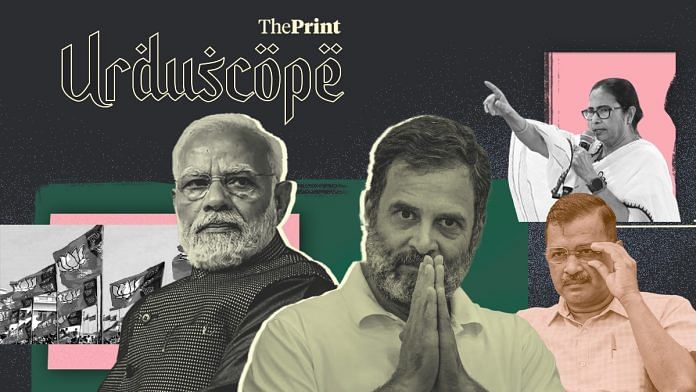New Delhi: The opposition coalition has surpassed its set target of forming the government and has left the Bharatiya Janata Party (BJP) and its allies far behind, an editorial Roznama Rashtriya Sahara said in an editorial on 22 May.
With India’s mammoth seven-phase general election in its last two phases, Sahara predicted that the remaining seats are now just a toss-up, and the BJP is fighting “a losing battle”.
While the results will be known only on 4 June, the “filth” spread by political parties in society during the last five phases of the campaign is unprecedented in electoral history, the editorial said.
“The aggressive style of election campaigning by the BJP, with its unethical statements, weak and irrelevant arguments, and divine claims, has especially shattered the fabric of social harmony to the utmost extent,” the editorial said.
Sahara also dedicated one editorial to Iran’s late president Ebrahim Raisi, who died in a plane crash on 19 May.
Here’s a wrap-up of all the news that made the editorials of the Urdu press this week.
Also Read: Urdu press questions timing of EAC-PM report on Muslim population, wonders if it’s ‘preemptive’
BJP’s ‘losing’ battle
In its 24 May editorial, Siasat wrote that the sixth phase of elections continued the negative campaigning seen in the previous phases. Leaders and parties, particularly the BJP, spread hatred and divisiveness to gain political advantage, neglecting real issues and focusing on communal sentiments.
As the election process nears its end with the seventh phase on 1 June, it is evident that all political parties have played a role in tarnishing India’s democracy.
“From the prime minister to some chief ministers and several ministers and other leaders, they have made every effort to erase real and fundamental issues from people’s minds. If there is one thing they remember, it is the hatred towards Muslims. Repeated attempts were made to remind people who attended the inauguration of the Ram Temple and who did not,” said the editorial, further emphasising that the entire nation witnessed how they tried to exploit religious sentiments to create fear and division among people.
On 24 May, Inquilab advised the Election Commission of India to recognise its responsibility amid clear signs of political change. The editorial emphasised that the commission must reflect the true public opinion stored in EVMs, maintaining its independent and impartial status.
“With numerous complaints from political parties, the public, journalist organisations, and commentators, the commission should clarify which complaints are valid, which are baseless, how many have been resolved, and how it will ensure impartiality and transparency in presenting the public’s opinion on 4 June,” it said.
In its 22 May editorial, Siasat addressed the Election Commission’s directive against communal rhetoric, noting that leaders keep up public enthusiasm with various claims.
“Recently, different sources are claiming that the BJP will secure a third term. This tactic aims to influence public perception, with slogans about winning over 400 seats or assurances of a third term. These actions indirectly violate the code of conduct, using certain institutions to mislead the public with personal opinions and surveys,” this editorial said.
Like Inquilab’ Siasat, too, criticised the negative campaigning in the fifth phase of voting, highlighting how the ruling party and its leaders disregarded election rules to prioritise winning.
“Religious exploitation marred the process, shifting focus away from people’s concerns to temples and mangalsutras. This exemplifies some of India’s most negative election tactics,” this editorial, published on 21 May, said.
On 20 May, the newspaper criticised Prime Minister Narendra Modi for not holding press conferences. The editorial, titled ‘Why escape from tough questions?’, said that even during the current election process, Modi has only given interviews to a few favoured corporate-run institutions.
“These sycophantic anchors present his interviews as prestigious events, avoiding tough questions. There is a fear that real journalists might ask why inflation hasn’t decreased, where the promised 20 million jobs are, and why black money from abroad hasn’t been brought back,” it said.
Opposition
In its editorial on 18 May, Inquilab said the ruling party had a strong belief that opposition parties would not unite. According to the editorial, this view is cemented by public infighting and bickering within the opposition INDIA bloc.
There’s little hope among parties to become a unified voice for the people or strengthen a new politics of cooperation, the editorial said. “They’re visibly angry, critiquing each other and appealing to voters across party lines”.
This stance underscores the ruling party’s strategic efforts, reflecting public sentiment. It’s evident that activists and voters across different parties show unity in their support, signalling a desire for a cohesive non-BJP alliance, the editorial said.
“The ruling party was fully confident that no consensus would be reached among opposition parties. Parties themselves were not hopeful of fostering such goodwill and unity that they would emerge as the voice of the people, strengthening a new politics of cooperation and unity,” Inquilab wrote.
Iran president’s death
Sahara‘s 21 May editorial paid tribute to Iran’s late president, Ebrahim Raisi. Raisi, it said, prioritised strengthening Iran’s economic ties, especially with China, through a significant investment agreement in the oil, gas, and petrochemical sectors.
“His presidency also emphasised enhancing relations with India while managing regional dynamics with countries like Saudi Arabia, Syria, and Yemen. Raisi’s tenure underscored Iran’s strategic engagements and economic strategies aimed at sustaining long-term growth and stability,” it said.
(Edited by Uttara Ramaswamy)
Also Read: ‘How will the truth come out?’ — Urdu press on sexual harassment allegation against Bengal governor



